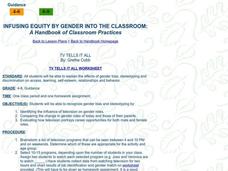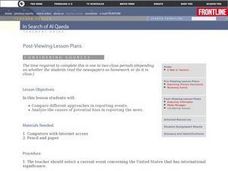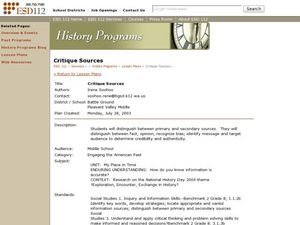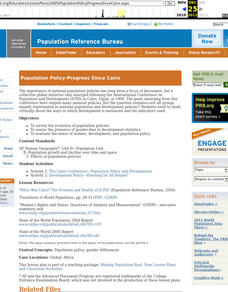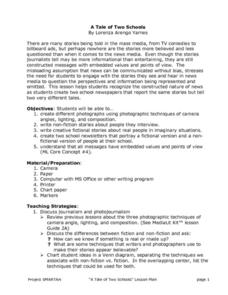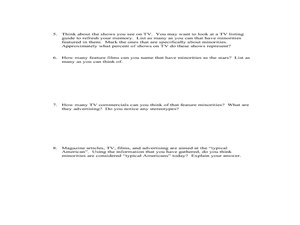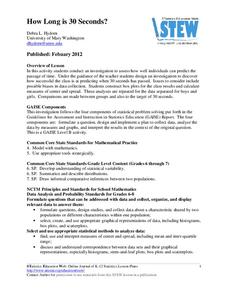Committee for Children
Students Learn to Stop Rumors Before They Start
Two activities look at how rumors are spread and ways class members can stop them. The first activity brings forth an in-depth conversation about how reporters gather information to write articles and how students can implement the same...
Teaching Tolerance
Media Consumers and Creators, What Are Your Rights and Responsibilities?
Teach the class to separate fact from fiction. Scholars explore the topic of fake news as they read PEN America's News Consumers' Bill of Rights and discuss the rights and responsibilities outlined in the bill. Next, they read an article...
Newseum
'The Press and the Civil Rights Movement' Video Lesson
Scholars watch a video featuring journalists who covered the civil rights movement, then respond to questions on a viewing guide. The video features interviews with participants and original news footage from the 1950s and 1960s. In...
Curated OER
TV TELLS IT ALL
Students identify the influence of television on gender roles and talk about how they are changing.
Curated OER
Journalism: Potential Bias
Students investigate a current event involving the United States from different journalistic viewpoints. They compare a Western newspaper with one from the Middle East and submit written evaluations noting agreements and disagreements in...
Curated OER
Designing Samples/Simple Random Samples
Learners explore the concept of sampling techniques. In this sampling techniques lesson, students identify possible sources of bias in situations such as phone polls, supermarket surveys, and drawing names from a phone book. Learners...
Curated OER
Fact, Fiction, or Bad Memory
Students identify bias in how the events of the Boston Massacre were reported. They attempt to determine who is to blame for the Boston Massacre by determining the reliability the of sources.
Curated OER
Critique Sources
Middle schoolers distinguish between primary and secondary sources. They study about fact, opinion, and recognize bias. Students find out if information is accurate or not and report on it. For the final project middle schoolers create...
Curated OER
Population Policy-Progress Since Cairo
Young scholars survey the evolution of population policies. They assess the presence of gender-bias in development statistics. They evaluate the nexus of women, development, and population policy.
Curated OER
The Atomic Bomb Dilemma
Students examine consequences of using atomic bomb in light of resulting peace, distinguish between fact and opinion and analyze sources to recognize bias and points of view, and assume role of reporter, critic, cabinet member, or...
Curated OER
Focus on the Media
Students critically examine news articles and editorials for attitudes of discrimination and prejudice. Students then complete checklist in which they analyze news reports for context, content, point of view, language, graphics, and...
Curated OER
Newspaper Writing on Flight in History
Students read about important events in history through newspaper articles. In this newspaper lesson, students look at different writing styles and author's bias in different articles about the same event. They write their own articles...
Anti-Defamation League
Identity-Based Bullying
What is identity? What is bullying? What is identity-based bullying? After discussing these questions as a class, pupils engage in partner discussions before participating in a small group activity to act out bullying scenarios. Then,...
Idaho State Department of Education
Lessons for Social Studies Educators
Point of view, purpose, and tone: three concepts readers of primary and secondary source materials must take into account when examining documents. Class members view a PowerPoint presentation and use the SOAPS strategy to identify an...
Curated OER
News Journalism Across the Media: Introduction
Although students are aware of news as information that influences their perceptions of the world, they are often unaware of the various ways to present that information. Encourage them to investigate, discuss, analyze and make valuable...
Curated OER
Aboriginal Education - A Canadian Failure?
Students discover that the education of the Aboriginal was a government and church "mission." They develop respect for the Aboriginal people and their continuing concerns about their treatment at the hands of the missionaries and the...
Curated OER
Abercrombie & Fitch Catalogue: Is it Pornographic?
Young scholars research the legal definition of pornography from a law textbook, reference books available in class or online. Students view the Abercrombie and Fitch home page. A selection of resources related to this topic is linked....
Curated OER
Exploring Media: Understanding and Identifying Editorial Perspective in Television and Radio News
Learners research the topics Boat People: A Refugee Crisis, Dr. Henry Morgentaler: Fighting Canada's Abortion Laws, and CANDU: The Canadian Nuclear Reactor on the CBC Radio and Television Archives Web site.
Curated Video
Detecting Lies & Harmful Links
Who and what can you trust online? How do you know? After viewing a pair of introductory videos on positive and safe online conduct, learners discuss the content and put it into practice during an online search activity about alien...
Curated OER
A Tale of Two Schools
Students create different photographs using photographic techniques of camera angles, lighting, and composition. They write non-fiction stories about people they interview and create two school newsletters that portray a fictional...
Curated OER
Researching African Americans Who Made a Difference
Celebrate Black History Month with this lesson, in which middle schoolers create an essay about a famous African-American. Writers conduct research online, take notes to write an essay in proper format, and use ideas, text, and graphics...
Curated OER
Minorities in Mainstream American Society
So many people fought for Civil Rights in the United States. Read about the Civil Rights Act of 1964, and discuss what the act guarantees. Then pass out a slew of magazines and encourage them to observe how often minorities appear in...
Curated OER
Worksheet for Analysis of a Letter
Dear Nancy, how do you analyze a letter? Love, Trez. Dear Trez, you use a Letter Analysis Worksheet. Love, Nancy.
This richly detailed worksheet provides multiple questions that lead researchers step-by-step through the process of...
American Statistical Association
How Long is 30 Seconds?
Is time on your side? Pupils come up with an experiment to test whether their classmates can guess how long it takes for 30 seconds to elapse. They divide the class data into two groups, create box-and-whisker plots, and analyze the...





